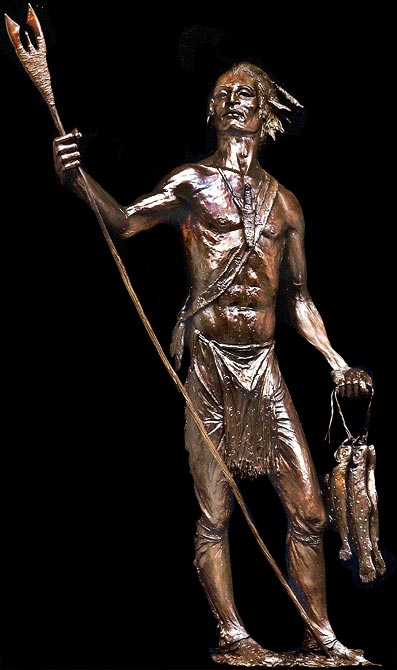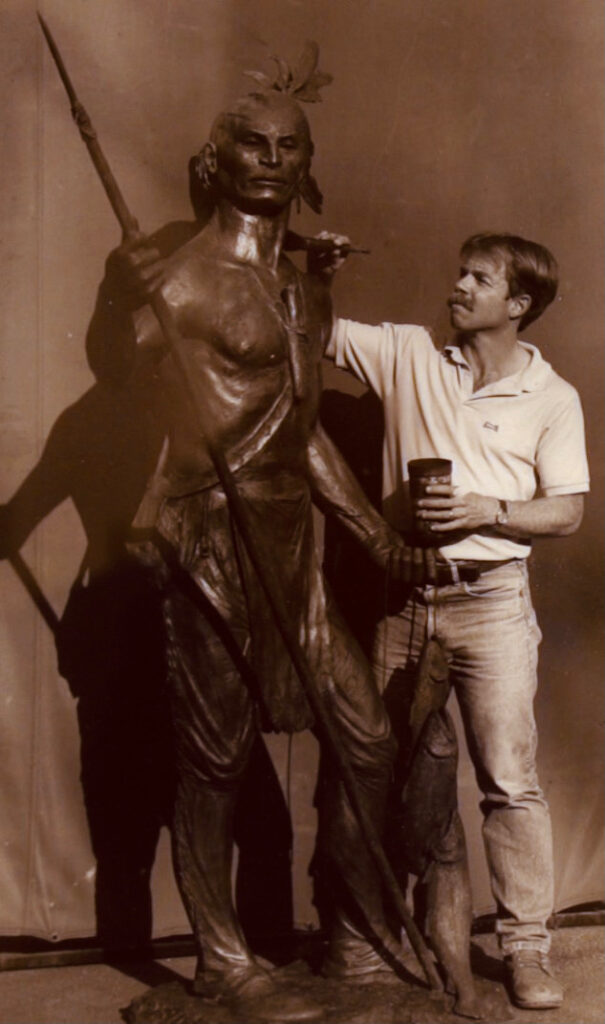Bronze edition: 10 | Height: 20″
“The men employ their time solely in hunting and other exercises of the bow, except that they sometimes take some pains at fishing.”
Edward Winslow (c. 1630)
Intuitively the Indians knew how essential it was to live in a right relationship with the land and its resources. They lived in America for countless generations, in a state of balance or as a christian might say in a state of grace. Indeed, one interpretation of the origin of the word Indian (from the Spanish “in Dios”) is that Columbus, observing the natives he encountered “lived in such blessed harmony with their surroundings,” that he called them “una gente in Dios” – “a people in God.”
In the words of the 20th century naturalist, Aldo Leopold: “conservation is a state of harmony between man and the land. When we see the land as a community to which we belong, we may begin to use it with love and respect.” It is this harmonious relationship, this oneness with “The Master of Life whom we believe to be in all things,” that underlies and makes comprehensible the character of the red man.
“They think that the Great Spirit made the earth and all that it contains…whatever liveth on land, whatever groweth out of the earth, and all that is in the rivers and waters was given jointly to all.”
John Heckewelder (1819)
“They laugh when you talk to them of submission…for they cannot reconcile the idea of submission with the dignity of man. Each individual is a sovereign in his own mind; and as he conceives he derives his freedom from the Great Spirit alone, he cannot be induced to acknowledge any other power.”
John Long (1791)
“The great and fundamental principle of their policy is, that every man is naturally free and independent; that no one on earth has a right to deprive him of his freedom and independence and that nothing can be compensation for the loss of it.”
Robert Rogers (1765)
“Among these people every man is a king unto himself and no man is above any other.”
Jesuit Relations (c. 1640)
“According to humane reason guided only by the light of nature, these people leade the more happy and freer life, being voyde of care which torments the minds of so many christians…they may be accounted to live richly, wanting nothing that is needful and to be commended for leading a contented life.”
Thomas Morton (1637)
“They went about their daily tasks with a great leisure for their days are all nothing but pastime. They are never in a hurry. Quite different from us who can never do anything without hurry and worry…because our desires tyrannize over us and bannish peace from us.”
Pierre Biard (c. 1680)
“They brand us for slaves whose lives are not worth living…(maintaining) that their way of life surpasses all our riches; that all our sciences are not so valuable as the art of leading a calm and peaceful life.
Baron Lahontan (1703)
“They are tall and straight; tread strong and clever and walk with a lofty chin.”
Wm. Penn (c. 1685.)
“Know that I alone am king of me”.
“Obeyed as sovereign by thy subjects be But know that I alone am king of me I am as free as when nature first made man ‘Ere the base laws of servitude began When wild in the woods the Noble Savage ran.”
John Dryden (c. 1660.)
This is the original model which led to the first free standing monumental bronze sculpture in Chattanooga, Tennessee titled “Cherokee.” Also see the Jud Hartmann study also called “Cherokee.”







